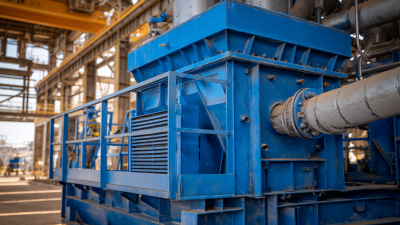When it comes to maintaining a comfortable indoor environment, selecting the right Air Conditioning Filter is a crucial yet often overlooked factor. With a myriad of options available, understanding the specific needs of your system and home is essential for optimal performance and air quality. This complete guide will equip you with the knowledge needed to make an informed decision, including essential tips and considerations tailored to your unique requirements. From understanding MERV ratings to recognizing the importance of filter size, we will delve into various aspects that can influence the efficiency of your air conditioning unit. Whether you are a first-time homeowner or a seasoned pro, this guide will provide valuable insights that can enhance your air conditioning experience, ensuring you breathe cleaner and fresher air all year round.

Air conditioning filters are a critical component of any HVAC system, significantly impacting both indoor air quality and system efficiency. According to the U.S. Environmental Protection Agency (EPA), indoor air can be 2 to 5 times more polluted than outdoor air, making effective filtration crucial. A high-quality filter can capture up to 99% of airborne particles, including pollen, dust mites, and pet dander, thereby reducing allergens and creating a healthier living environment. This is particularly important as the EPA highlights that poor indoor air quality can lead to respiratory issues and other health problems.
Moreover, the right air conditioning filter can improve system efficiency, which directly affects energy consumption. The Department of Energy reports that replacing a dirty filter can lower energy usage by 5% to 15%. Many consumers underestimate this impact, often ignoring the need for regular filter changes. Choosing a filter with an appropriate MERV (Minimum Efficiency Reporting Value) rating ensures that it not only captures harmful particles effectively but also maintains optimal airflow. Filters with a MERV rating between 8 and 13 are generally recommended for home use, balancing filtration efficiency with energy performance.

When selecting the right air conditioning filter for your system, understanding the different types available is crucial. The most common types include fiberglass, pleated, HEPA, and electrostatic filters. Fiberglass filters are economical and suitable for basic filtration needs, while pleated filters offer better efficiency due to their increased surface area. HEPA filters are ideal for those who require high levels of air cleanliness, capturing 99.97% of particles. Electrostatic filters use static electricity to attract dust and allergens, making them a great option for allergy sufferers.
Tips for choosing the right filter include checking your system's specifications, as not all filters fit every model. Consider the MERV (Minimum Efficiency Reporting Value) rating, which indicates the filter's efficiency; higher MERV ratings mean better filtration but may reduce airflow in some systems. Lastly, think about your specific needs. If you have pets or allergies, investing in a higher quality filter can significantly improve your indoor air quality. Regular maintenance and replacement of filters are vital to ensure the optimal performance of your air conditioning system.
When choosing an air conditioning filter, it’s essential to consider various key features that can significantly impact your indoor air quality and system efficiency. One critical aspect is the MERV (Minimum Efficiency Reporting Value) rating, which indicates the filter's ability to capture particles. Filters with a MERV rating between 8 and 12 are recommended for residential use, as they effectively trap dust, pollen, and pet dander, contributing to a healthier environment. In a study conducted by the American Society of Heating, Refrigerating and Air-Conditioning Engineers (ASHRAE), it was noted that higher MERV ratings correlate with better air quality but can also affect airflow. Thus, striking the right balance is crucial.
Another vital feature to consider is the filter type—whether HEPA, electrostatic, or fiberglass. HEPA filters, with their efficiency at capturing airborne particles down to 0.3 microns, are often preferred in environments where air quality is paramount, such as homes with allergy sufferers. On the other hand, electrostatic filters can be washed and reused, offering a more environmentally friendly option. According to a report by the Environmental Protection Agency (EPA), maintaining clean filters can enhance HVAC system performance and lead to energy savings of up to 15%. Therefore, selecting the right air conditioning filter not only contributes to improved air quality but also aids in the efficient operation of your cooling systems.
This chart displays the filtration efficiency of various air conditioning filter types. As evidenced, HEPA filters offer the highest efficiency, making them a popular choice for air quality improvement.
When it comes to maintaining your air conditioning system, the filter plays a crucial role in ensuring optimal performance and air quality. Regularly replacing and maintaining your air conditioning filter can significantly enhance the efficiency of your unit. Depending on the type of filter you have—be it a disposable, washable, or HEPA filter—the frequency of replacement may vary. Generally, it is recommended to check your filter monthly and replace it every three months, or sooner if you notice a decrease in airflow or an increase in dust accumulation in your home.
In addition to replacement, proper maintenance of your air conditioning filter is key. This includes cleaning washable filters as per the manufacturer's instructions and ensuring the filter fits securely in its designated slot. A well-maintained filter can help reduce energy consumption, lower utility bills, and prolong the lifespan of your air conditioning system. Moreover, an effective filter can capture allergens and pollutants, providing a healthier indoor environment for you and your family, especially during peak allergy seasons.
When it comes to maintaining your air conditioning system, it is essential to understand the common air filter problems that can arise and the solutions to address them. One prevalent issue is clogging, which can occur due to dust, pet dander, and other airborne particles. A clogged filter restricts airflow, making your air conditioning unit less efficient and leading to higher energy bills. To rectify this, it's crucial to check and replace your filter regularly, ideally every one to three months, depending on usage and environment.

Another common problem is the use of the wrong filter type. Not all filters are created equal; some are designed to capture larger particles, while others are optimized for allergens or odors. Choosing the right filter not only enhances air quality but also extends the lifespan of your HVAC system. If you notice reduced airflow or unusual noises from your AC unit, it may be time to reassess the filter being used. Always consult your manufacturer’s guidelines to ensure that you are selecting a filter that fits both your needs and the specific requirements of your air conditioning unit.






